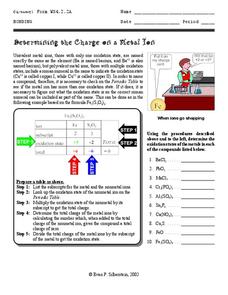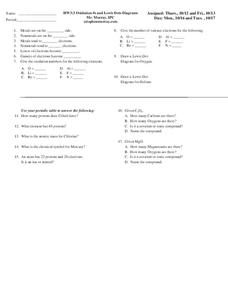Chemistry Teacher
Metals, Nonmetals, and Metalloids Lab
What an exciting way to introduce your blossoming chemists to the world of metals, nonmetals, metalloids, and polymers! Here is a lab activity that is designed to allow pupils the opportunity to visualize the reaction of metals,...
Creative Chemistry
Metals and Non-Metals
A half-page chart compares the properties of metals and nonmetals. Properties include appearance, melting and boiling point, density, strength, malleability, ductility, heat and electrical conductivity, and the nature of their oxides....
Pingry School
Comparing Activities of Selected Metals
Don't overreact! A simple experiment demonstrates chemical reactions as scholars mix chemical solutions and metals in a large well plate. They note all changes to the metals, solutions, precipitate, colors, and more. A full data table...
It's About Time
Metals and Nonmetals
Did you know you can melt the metal gallium with just the heat of your hand? Pupils observe and test materials in order to classify them as metal or non-metal. A reading passage and analysis questions wrap up the lesson.
Curated OER
Amazing Carbon
Explore carbon and bonding with this learning exercise. First, class members read a short excerpt about carbon and its characteristics. In response to the reading, they draw an electron dot diagram of carbon as well as diagrams of...
Curated OER
Molecular Structures-Nonmetals
In this molecular structures worksheet, students explore the structures of 6 nonmetal elements using an interactive online website.
Curated OER
What do Atoms Look Like?
In this atoms worksheet, students complete 58 questions about the atomic radius of atoms, the ionization energy, the valence electrons, metals, non-metals and semi-metals and the families of elements.
Curated OER
What do Atoms Look Like?
In this atom worksheet, students complete 60 questions about the trends in atoms such as ionization energy and atomic radius, about valence electrons, about the families of elements, about metals, non-metals and semi-metals, about the...
Curated OER
Groups in the Periodic Table
In this groups of the periodic table worksheet, high schoolers use on line sources to find characteristics of the alkali metals, the alkaline earth metals, the transition metals, the halogens and the inert gases.
Curated OER
Properties of Ionic Compounds
In this compounds worksheet, students describe why metals and nonmetals form ionic compounds and why the formation of ionic compounds are exothermic. This worksheet has 5 short answer questions.
Curated OER
Applying the Activity Series
In this activity series activity, high schoolers read about single replacement reactions and are given a table with the activity series of metals and nonmetals. Students use the activity series to predict if reactions will occur and they...
Curated OER
Determining the Charge on a Metal Ion
In this metal ion worksheet, students follow the steps to determine the oxidation states of the metals in each of the given compounds. Students complete 10 problems.
Curated OER
Discovering Elements
In this elements worksheet, students compare and contrast metal and nonmetal characteristics. Students also look at the metals found in vitamins. This worksheet has 8 true or false, 10 multiple choice, and 4 short answer questions.
Curated OER
Naming Compounds
In this naming compounds worksheet, students are given a chart to determine if the compound they are naming is ionic, covalent or polyatomic. Students practice identifying and naming ionic, covalent and polyatomic compounds. They define...
Curated OER
Color Coding the Periodic Table
In this periodic table worksheet, students color code the periodic table to show groups of elements, the states of elements, if they are man-made or synthetic elements, if they are radioactive and the number of electrons in their outer...
Curated OER
Periodic Table Basics Make-Up Test
In this periodic table activity, students complete a table of elements with their atomic number, atomic mass and symbol. They classify elements by their group name and distinguish between metals, nonmetals, and semi-metals. They also...
Curated OER
Periodic Table Basics Review Sheet
For this periodic table worksheet, learners complete a chart with the appropriate element symbol, the atomic mass and the atomic number. They classify elements by their groups and as metals, nonmetals or semi-metals. They also answer two...
Curated OER
Unit 4 - Periodic Table
There are 17 multiple choice questions on this periodic table test. The focus is on properties of the elements by group and period. The exam is not formatted well, making it a little difficult to read. There is also a typographical...
Curated OER
The Structure of Matter
In this matter activity, high schoolers compare and contrast chemical and physical properties and explain the relationship between a pure substance and a mixture. Students review the properties of metals and nonmetals. This activity has...
Curated OER
Oxidation Numbers
In this oxidation numbers worksheet, students compare metals and nonmetals, draw Lewis Dot Diagrams, and determine the oxidation number for the given elements. This worksheet has 1 multiple choice, 5 short answer, and 12 fill in the...
Curated OER
Oxidation Numbers
In this oxidation numbers worksheet, students determine the oxidation number for given elements and draw Lewis Dot Diagrams. This worksheet has 6 fill in the blank and 11 short answer questions.
Curated OER
Metals and Nonmetals
In this elements worksheet, students determine if the given elements are metals or nonmetals. Students give the valence electrons for other elements. This worksheet has 10 fill in the blank questions.
Curated OER
Families of Elements
In this elements worksheet, students classify the given elements according to where they are located in the periodic table. This worksheet has 1 short answer and 4 fill in the blank questions.
Curated OER
Elements, Compounds, and Mixtures
In this elements, compounds, and mixtures worksheet, students answer questions about the properties of elements, mixtures, and compounds. Students identify the physical changes that is made to a substance to determine if it is an element.























